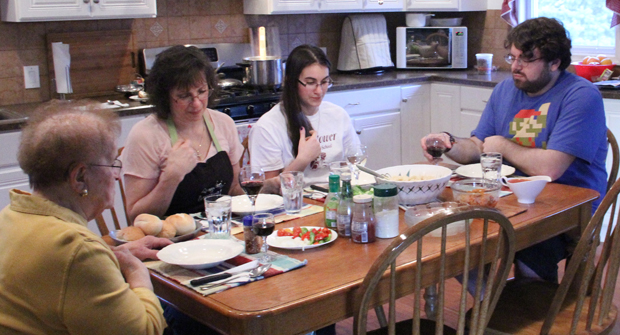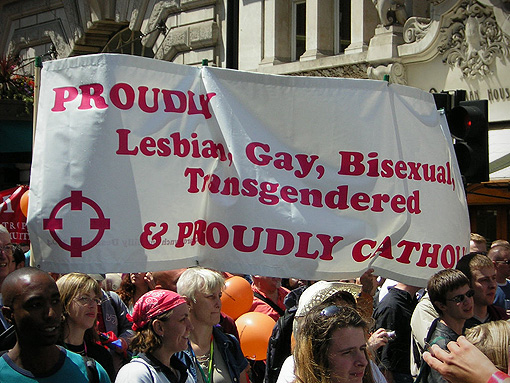One of the key elements of Pope Benedict’s Caritas in Veritate is a call for “quota of gratutiousness and communion” within economic activity itself (no. 39). These “internal forms of solidarity and mutual trust” (no. 35) are promoted by “commercial entities based on mutualist principles and pursuing social ends” which work toward “civilizing the economy” (no. 38). Such firms overcome the “exclusively binary model of market-plus-State” and make room “within the market for economic activity…according to principles other than those of pure profit” (no. 37).
Is Starbucks a model for this? Time’s cover story on Starbucks CEO Howard Schultz offers some interesting data on this. Schultz has long been outspoken in his use of the company for progressive causes. The article notes that “[i]n recent years, Schultz has taken on student debt, health care, veterans’ rights, youth unemployment and gun violence.” In the wake of racial conflicts over police shootings, Schultz organized gatherings of his employees in major cities where “top managers to entry-level baristas could speak frankly about their experiences with racism.” The article even quotes anti-tax conservative Grover Norquist, who speaks approvingly of Starbucks’ programs for subsidizing college courses and hiring veterans, noting, “Howard isn’t saying, Hey, I’ll give you a check. He saying, I want your skills….”
All of this seems admirable. Moreover, at least according to its own reports, Starbucks is making significant progress towards its 2015 goal of having 100% of its coffee meet its own ethical standards for sourcing. Of course, to continue its business expansion, it is also planning a new series of “luxury Reserve stores, where customers can get a more rareified and expensive assortment of coffee,” according to the Time article. This past Christmas, its website sold out of exclusive sterling silver gift cards – at $200 a pop (h/t Bob Sullivan). And in one of the more striking factoids in the article, Schultz’s obsessive tracking of daily store numbers reveals that “sales will rise and fall with the national mood” – he registered large drops in sales during, for example, the government shutdown and the Ferguson violence. These reveal to Schultz that America is “fragile,” one in which people feel that “government is no longer functional and that no one is looking out for the welfare of the middle and working classes” – and a fragile America is not good for the daily trip to the expensive coffee shop!
All of which is to say that Starbucks’ acts of economic solidarity are built on a business model of big margins on an item that is a treat – after all, the ingredients in the $2.50 coffee or (even more) the $5 latte cost the company only a few cents. Even with all these generous initiatives, the company is able to maintain a profit margin of over 10% of sales. That margin doesn’t automatically translate into generosity – McDonald’s posts an almost 20% margin, and yet doesn’t follow suit (though it would be interesting to consider how franchising constitutes a different business model). Yet the margin for fast food in general is far greater than lowly retail, where margins in the 3% range are common for large discounters and grocers. Thus, while the prospect of large margins built on the ability to charge customers a high price does not guarantee acts of solidarity, it does seem like it might be a prerequisite for it.
It may be that the lowest price is not a just price. The idea of a just price is common in the history of Catholic economic thought, but the idea falls into disuse, in favor of simply taking the market price as just (short of fraud or monopoly). One article from the free-market von Mises institute is titled “The Myth of the Just Price.” But the example of Starbucks suggests that there is some reason to think that highly competitive markets actually drive prices below a just price. It’s not that Starbucks doesn’t operate in a competitive market – but it does manage to compete on other things than price. Or put another way, it depends on the generosity of consumers who are willing to pay more for coffee drinks than might be “the best deal.”
The Time article outlines how Starbucks is facing competition from competitors trying to undercut it – from McDonald’s to 7-Eleven to even Taco Bell. And it is struggling to come up with a model to serve those who want “bare-bones $1 coffee.” But it may be that what makes economic solidarity possible is the willingness of the consumer to pay more. Seeking the lowest price may seem like a virtue; but maybe the lowest price is incompatible with an economics of gratuitousness and solidarity. And $200 silver gift cards? Well, there might be other ways to pay more for other things to spread that solidarity… The question is how we encourage businesses in other areas to charge us more so that they can do the sorts of things Starbucks does.





